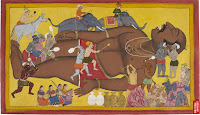The religion Hinduism also called as Sanatana dharma is a
major religion practiced predominately in Indian sub-continent and other
neighboring countries in Asia, but once it was spread all across Asia and further,
and It is considered to be the oldest surviving religion on the planet, with no
single person as a founder.
These are the few rare and untold facts about Hinduism,
which are unknown to the masses:
Dharma is above all:
The Hindu scriptures say that following dharma (the right
way, righteousness, duties, and law) is more important than following the words
of God himself, nothing in the universe can stop or harm a person if he’s
fulfilling his dharma, including god himself, without which the universe and
life will not exist.
There is no supreme god:
Though Hindu scriptures mention the supreme trinities Brahma (creation), Vishnu (energy), Shiva (emptiness, dark energy), but there were a lot
of incidents mentioned in different Puranas, where the trinities take help of
each other in making and sustaining of the universes, concluding there is more
than one form of energies acting in creation and destruction of the universes.
God is formless:
| 10 avatars of lord vishnu |
Though many describe god to be in human form, according to
the scriptures he has no form, shape, nor gender, he can take different shapes
and forms that suit the situations. In the Dashavatara of Lord Vishnu, we can
notice the different kinds of forms he takes to bring back dharma on earth.
There are no heaven and hell, but heavens and hells!
 |
| differeant lokas according to jain texts |
Unlike any other major religions that specifies earth,
heaven and hell, but Hinduism scripts mentions 14 realms in the universe, 7 as
hell and 7 as heaven, and every life forms in the universe will have a chance
to take birth and death in all these realms based on their previous birth’s
deeds/Karma. And earning Moksha/salvation is considered to be the greatest feat
in the universe, which would free a person from a cycle of birth and death.
Unique calendar and time system:
The Hindu calendar or Vedic calendar, which is followed by
all Hindus in India and across the globe, follows a circular concept of time,
whereas the Gregorian calendar which is widely used across the world follows
the linear concept of time. According to Vedic scriptures, everything is
cyclical in the cosmos, so does the time.
In Vedic calendar and timing is based on movements of planets
and other celestial bodies in space, and is very complex. The time is
calculated so precisely to microseconds to the time dilation between the earth
and other planets.
The fertility of earth decreases by each Yuga:
 |
| the size of kumbakarna, brother of ravana (Ramayana) |
According to Vedic scriptures the years on earth is divided
by 4 yugas, and by each Yuga passes the duration of time (years), fertility of
life forms decreases by time:
- Sathya Yuga = number of solar years = 1,728,000 | average human height = 33f, 6 inches | average human life span = 100,000 years.
- Treta Yuga = Number of solar years = 1,296,000 | Average human height = 22ft 4 inches | Average human lifespan = 10,000 years.
- Dwapara Yuga = Number of solar years = 864,000 | Average human height = 11ft 2 inches | Average human life span = 1000 years.
- Kali Yuga = Number of solar years = 432,000 | Average human height = 5ft 3 inches | Average human life span = 100 years.
Ocean of knowledge:
Ancient Hindus passed on lot of scriptures and books, which
are beyond science and imagination to the modern humans, which speaks about,
administration, weapons, warfare, relation between planets and realms, advanced
sciences that includes space travel, medicines, flying machine, description of
different planets, evolution of cosmos and many more. Few of the important
Hindu books are:
- 4 = Vedas
- 18 = Puranas
- 108 = Upanishads
- Mahabharata
- Ramayana
- Bhagavad-Gita
- 6 = shastras
ALSO READ: THE UNTOLD SECRETS OF THE UNIVERSE | EXPLAINING HEAVEN AND THE HELL!



Comments
Post a Comment